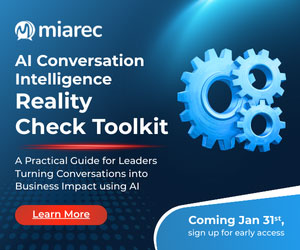As self-service and automation increasingly handle straightforward interactions, human agents are taking on ever-more complex, emotionally charged tasks. This shift demands new skills, more autonomy, and a redefined relationship between technology and human talent.
That why we’ve brought together key insights from our latest research – along with expert opinions from Dr Nicola Millard and Maria McCann – to put the spotlight on the evolving role of agents, the skills they will need, and how organizations can begin to future-proof their workforce in an AI-augmented environment.
The Evolving Role of Human as “Advisors”
Automation and AI have removed a significant portion of routine, transactional work from contact centres. This change is not just about efficiency – it fundamentally shifts the nature of human work.
Simple queries are increasingly resolved via chatbots, knowledge bases, and automated workflows, leaving agents to handle the issues that require judgement, discretion, and emotional intelligence.
In practice, this means agents are no longer just order takers or problem processors – they are advisors and decision-makers. They need to interpret complex data, make decisions quickly, and manage emotionally charged interactions with customers.
That’s why it was largely unsurprising to see 42% of contact centre professionals identifying analytical and problem-solving skills as most important for agents in the future – in our 2025 Report: What Contact Centres Are Doing Right Now.
As Dr Nicola Millard, Principal Innovation Partner at BT Business, explains:
“Humans are now advisors, resolving more complex, emotionally charged issues often caused by factors beyond their control.
This demands strong analytical thinking and the ability to navigate ambiguity. Getting all these skills anatomically aligned in one person is a challenge – and one the industry must address as it redefines the role of the future contact centre.”
Communication and Empathy Become Increasingly Important
Communication and empathy will continue to be highly sought-after skill sets too! After all, AI can provide answers and prompt scripts, but it cannot replace the human touch (just yet!).
So, agents must still be able to:
- Calm frustrated customers
- Explain complex issues clearly
- Build rapport and trust
- Personalize interactions in real time
Research shows that these skills are critical, not only for customer satisfaction, but also for agent engagement and retention.
Empowerment is also a critical part of the puzzle, as empowered agents who feel capable of handling complex queries are more likely to remain in post and deliver consistently high-quality service.
As Maria McCann, Co-Founder of Neos Wave, adds:
“We’re moving away from rigid oversight to an operational partnership, where true empowerment isn’t just a message from leadership – it lives in the approach to decisions, knowledge, and coaching.”
For training teams, this means that soft skills development must be continuous and immersive – through role-play, mentoring, and on-the-job coaching – rather than one-off classroom sessions.
It Will Be “Business as Usual” for Agents to Collaborate With AI Tools
The future contact centre will also require agents to collaborate with AI tools. These tools can reduce cognitive load, handling tasks like wrap-up notes, real-time guidance, and backend processing. All of which frees agents to focus on high-value human tasks, such as negotiation, problem-solving, and conflict resolution.
However, collaboration with AI introduces a new set of challenges:
- Agents must learn to trust AI recommendations
- Multitasking becomes more complex as agents manage human and digital co-workers
- Continuous learning is essential to keep pace with AI capabilities
To help navigate this changing landscape, resilience will be critical – and organizations must also equip agents with coping strategies, stress management support, and a culture that encourages collaboration rather than isolation.
5 Practical Steps for Leaders
As AI becomes more deeply integrated into contact centre operations, leaders must take deliberate steps to ensure their teams are equipped to thrive in this evolving environment, including the following steps.
1. Develop a Structured Upskilling Programme
Developing a capable and confident workforce starts with structured, ongoing learning. Leaders should design training programmes that blend technical and human skills, ensuring employees not only know how to use AI tools effectively but also understand their role in enhancing customer experiences.
This means combining instruction in emerging technologies with continuous development in communication, empathy, and problem-solving.
Instead of relying on one-off training sessions, organizations should implement a culture of continuous coaching – where learning is reinforced through regular feedback, mentoring, and peer collaboration.
2. Empower Agents With Autonomy
In an AI-driven contact centre, agility and judgement are invaluable. Leaders can foster these qualities by empowering agents to make decisions within well-defined parameters, moving away from overly rigid scripts and approval processes.
By trusting employees to exercise discretion and creativity, organizations enable faster, more authentic customer interactions.
Real-world examples and case studies can be powerful tools for demonstrating what good decision-making looks like here, helping agents feel confident in taking ownership of their roles.
For advice on developing critical thinking skills in your agents, read our article: How to Improve Your Agents’ Critical Thinking Skills
3. Focus on Mental Wellbeing
As automation accelerates and workloads fluctuate, protecting mental wellbeing becomes a leadership imperative.
Contact centre work can be emotionally demanding, and the integration of AI – while beneficial – can also introduce new forms of stress and uncertainty.
Leaders should prioritize initiatives that build resilience, such as access to mental health resources, stress management workshops, and supportive peer networks.
Flexible working arrangements, such as hybrid schedules or shorter shifts, can further help reduce burnout and improve overall job satisfaction. A psychologically safe environment allows agents to adapt to change more effectively and sustains high performance over time.
4. Ensure Agents View AI as a Partner – Rather Than a Threat
The introduction of AI necessitates a clear redefinition of roles and responsibilities. Leaders should clarify which tasks are best suited for automation and which require human insight, empathy, and critical thinking. This ensures that agents view AI as a partner – rather than a threat.
Training should focus on helping agents interpret AI-generated insights, evaluate their reliability, and apply human judgement where nuance is required. By creating transparent frameworks for human-AI collaboration, organizations can enhance both efficiency and customer trust.
For information on where latest tech is having the biggest impact, read our article: 10 New Ways Tech Is Helping Agents Right Now
5. Provide Visible Career Pathways That Reflect the Growing Importance of Advisory and Consultative Roles
To retain and motivate top talent, recognition systems must evolve alongside changing job expectations.
Traditional metrics that prioritize speed or transactional efficiency should give way to rewards for qualities such as problem-solving, empathy, and initiative – skills that differentiate exceptional human service from automated responses.
Leaders should also provide visible career pathways that reflect the growing importance of advisory and consultative roles.
When agents see clear opportunities for growth and recognition in an AI-enhanced workplace, they are more likely to embrace innovation and contribute to long-term success.
The Agents Who Thrive Will Be Those Who Combine Analytical Thinking, Empathy, and Collaboration Skills With AI-Assisted Efficiency
The contact centre of 2026 and beyond will not be defined by technology alone. After all, AI and automation are tools – not replacements – and the agents who thrive will be those who combine analytical thinking, empathy, and collaboration skills with AI-assisted efficiency.
Therefore, leaders who invest in skill development, empowerment, and wellbeing today will see higher engagement, better customer outcomes, and improved retention – and ultimately create a service ecosystem where humans and AI are partners, each playing to their strengths. So, what are you waiting for?
Author: Megan Jones
Reviewed by: Xander Freeman
Published On: 19th Nov 2025 - Last modified: 20th Nov 2025
Read more about - Contact Centre Research, Artificial Intelligence (AI), Career, Employee Engagement, Employee Experience (EX), Empowering Agents, Five9, Health Wellbeing and Stress, Maria McCann, NiCE, NiCE CXone, Nicola Millard, Peopleware, Research, Scorebuddy, Skill Development, Top Story





















